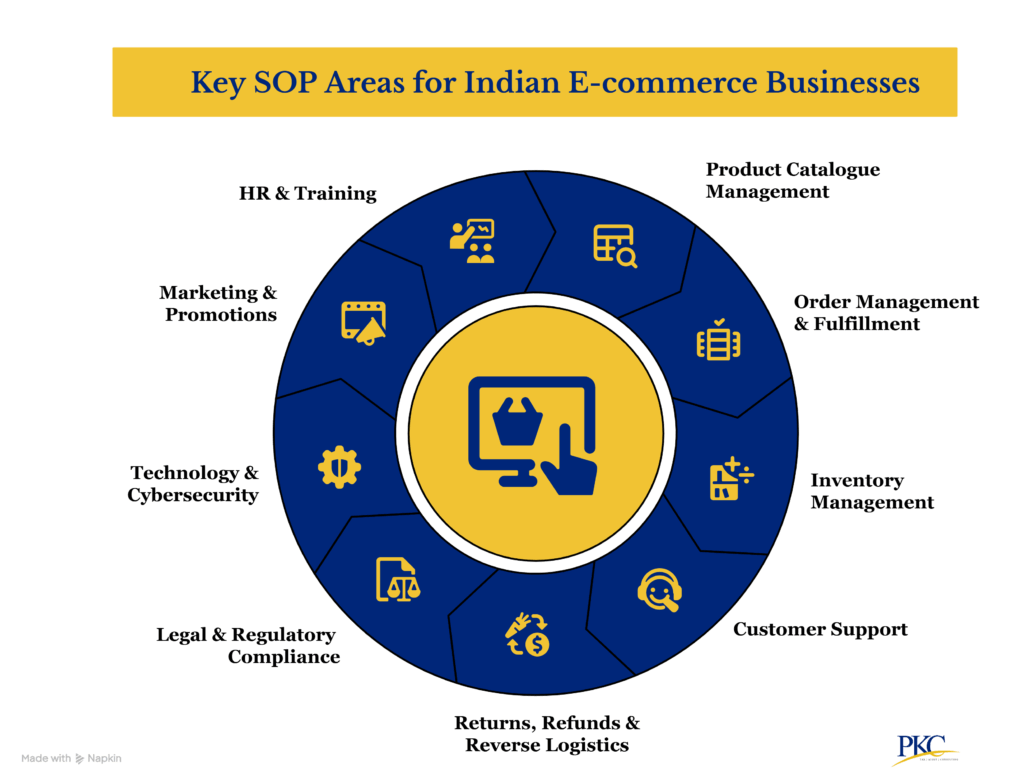If your ecommerce business struggles with late deliveries, customer complaints, or compliance issues, SOPs may be the lagging factor. From packaging and payments SOPs for ecommerce business can give your business the boost it needs.
Learn with us all about the regulations and standards that drive ecommerce SOPs and the types of SOPs you should consider implementing.
SOP vs No SOP for eCommerce Businesses
| Aspect | With SOP | Without SOP |
| Consistency | Tasks done same way every time | Processes vary by person |
| Training | Faster, easier onboarding | Slow, inconsistent training |
| Errors | Fewer mistakes | Higher error rate |
| Scalability | Easier to grow | Growth creates confusion |
| Efficiency | Tasks completed faster | Time wasted figuring things out |
| Accountability | Clear roles and ownership | Blurred responsibility |
| Quality | Standards are maintained | Quality varies |
| Customer Experience | More reliable service | Inconsistent experience |
| Compliance | Easier to meet regulations | Risk of non-compliance |
| Business Value | Increases resale value | Harder to sell or delegate |
Why E Commerce Businesses Need SOPs?
Standard Operating Procedures (SOPs) are structured, step-by-step instructions that guide how different business operations should be executed.
For an e-commerce business, SOPs ensure every task, whether its product listing or refund processing, is performed the same way every time, regardless of who’s handling it.
They provide a clear framework for teams, be it inventory, logistics, finance, customer support, and more, to work in alignment, reduce dependency on individuals, and deliver a consistent customer experience.
Here’s what makes SOPs important for E Commerce Businesses, especially in India:
1. Regulatory Compliance Made Simple
India’s regulatory landscape is complex and ever changing. SOPs ensure you follow rules consistently, including:
- GST returns and invoicing
- FDI compliance for marketplaces
- E-Way Bill generation for interstate shipments
- Adherence to IT, FSSAI, and data privacy norms
Without SOPs, businesses may face penalties, delayed shipments, and account suspensions.
2. Build Operational Resilience
India’s e-commerce sector faces:
- High employee turnover
- Fragmented logistics networks
- Diverse consumer behaviour across regions
SOPs help reduce person dependency and ensure critical knowledge stays within the business, making operations resilient even during staff changes or scale-ups.
3. Streamline Cash-on-Delivery (COD) Complexities
COD is still dominant in Tier II, III, and rural India. SOPs help manage:
- Cash reconciliation with courier partners
- Returns and RTO (Return to Origin) handling
- Fraud detection for fake orders or misuse of return policies
4. Faster Training & Onboarding
As businesses scale, training new hires becomes a bottleneck. SOPs reduce this burden with:
- Clear, replicable instructions
- Reduced learning curve
- Standardized expectations across teams and locations
This is especially useful for seasonal staffing during Diwali, Holi, or End-of-Season sales.
5. Enhance Customer Experience
Customers expect:
- Timely deliveries
- Accurate orders
- Hassle-free returns
SOPs ensure your customer service, logistics, and operations teams all deliver predictable and professional experiences, building brand trust and loyalty.
6. Reduce Costly Errors
Inaccurate invoices, delayed deliveries, stockouts, or packaging errors can damage brand reputation and increase operational costs.
SOPs reduce such risks by minimizing guesswork and standardizing procedures.
7. Support Business Scalability
Whether you’re expanding to new states or listing on more marketplaces, SOPs allow you to:
- Maintain consistent service quality
- Scale logistics without chaos
- Onboard new sellers or employees easily
A process-driven business is easier to franchise, replicate, or automate.
8. Improve Investor Readiness
Investors look for organized, scalable operations with minimal risk. Documented SOPs:
- Showcase professionalism
- Indicate readiness for scale
- Reduce key-man risk
This improves your chances during due diligence and valuation discussions.
9. Enable Continuous Process Improvement
With SOPs in place, you can:
- Track KPIs more effectively
- Spot inefficiencies
- Update processes regularly for better performance
They provide a foundation for continuous optimization using data and real-world feedback.

Key Regulatory Bodies for ECommerce SOP Compliance in India
In India, a number of regulators govern ecommerce business legality, tax, consumer rights, data security, payments, and product standard.
Here are the key regulatory bodies in India relevant for ecommerce SOP compliance:
| Standard/Regulation | Description | Impact on E-commerce SOPs |
| IT Act, 2000 | Electronic contracts, digital signatures, cybersecurity. | Ensure secure transactions and data privacy. |
| Consumer Protection Rules, 2020 | Transparency, grievance redressal, fair trade. | Include customer rights and complaint handling. |
| FDI Policy | Limits foreign ownership in e-commerce. | Comply with FDI restrictions on ownership. |
| BIS Compliance | Product quality certification. | Verify certifications during storage & dispatch. |
| FSSAI | Food safety and hygiene standards. | Ensure food safety and packaging compliance. |
| Data Protection (Proposed) | Data privacy and cybersecurity. | Implement data security and consent protocols. |
| Ban on Flash Sales & Exclusives | Restricts predatory pricing and exclusives. | Enforce fair pricing and prevent exclusives. |
| Related Party Transactions | Prevents preferential treatment. | Ensure non-discriminatory seller support. |
| GST Compliance | Tax rules for e-commerce sales. | Ensure accurate tax and invoicing processes. |
| Cybersecurity Compliance | Security updates and threat protection. | Follow IT security protocols and audits. |
Learn here about our Expert SOP & Process Mapping Services
Types of SOPs for Ecommerce Business in India
Here are some of the SOP types that an Ecommerce company should consider implementing:
Legal and Compliance SOPs
These SOPs ensure the e-commerce business adheres to all regulatory compliances. This protects against penalties, builds customer trust, and supports long-term sustainability.
- GST Compliance: Process for generating GST-compliant invoices, filing GSTR-1/GSTR-3B, and reconciling input-output data.
- E-Way Bill: Guidelines for generating E-Way Bills for interstate goods movement over ₹50,000.
- Consumer Protection Act (2019): Mandates clear return/refund policies, seller transparency, and fair pricing.
- Data Privacy (DPDP Act, 2023): Requires consent-based data collection, storage, and processing as per Indian law.
- IT Act & Cybersecurity: Enforces security protocols, breach reporting, and digital signatures under the IT Act, 2000.
Marketplace Onboarding & Vendor Management SOPs
These SOPs streamline onboarding and ongoing evaluation of vendors to maintain product quality, compliance, and timely fulfillment.
- Vendor KYC & Documentation: Checklist to verify PAN, GSTIN, bank details, and licenses for all new vendors.
- Vendor Agreements: Formal contracts outlining commissions, SLAs, payment terms, and penalties.
- Marketplace Onboarding: Compliance-based setup for seller accounts on Amazon, Flipkart, Meesho, etc.
- Performance Monitoring: Tracks returns, delivery timelines, defect rates, and customer feedback.
- Vendor Communication: Structured process for timely updates and grievance resolution.
Product Listing & Content Management SOPs
These SOPs ensure accurate, appealing, and search-optimized listings to enhance customer trust and discoverability.
- Product Photography: Standards for resolution, angles, lighting, and backgrounds by category.
- SEO Content Creation: Templates for keyword-rich titles, bullets, and descriptions to boost visibility.
- Regulatory Compliance: Ensures listings include MRP, origin, safety warnings, per Indian laws.
- Category Mapping: Accurate category and attribute tagging for better search and discovery.
- Bulk Upload & Sync: Standardized process for bulk product uploads and cross-platform syncing.
Order Processing & Fulfillment SOPs
These SOPs cover the end-to-end fulfillment cycle, ensuring accurate and timely delivery for better customer satisfaction.
- Order Verification & Fraud Checks: Confirms payment success and flags suspicious COD or high-value orders.
- Picking & Packing: Instructions for locating items, quality checks, and secure packaging.
- Shipping & Dispatch: Process for selecting couriers, generating labels, and handing over shipments.
- COD Handling: Guidelines for cash collection, order confirmation, and courier reconciliation.
- Returns & Refunds: Workflow for reverse pickups, product checks, and refund approvals.
Platform-Specific SOPs
These SOPs cater to the unique policies, algorithms, and compliance rules of various ecommerce platforms.
- Amazon India SOPs: Includes FBA shipping, Buy Box strategy, Amazon Ads, and Seller Central workflows.
- Flipkart SOPs: Covers Flipkart Advantage, festive sale participation, and policy compliance.
- Website SOPs (Shopify/Magento): Manages backend, payment setup, discounting, and consistent UX.
- Inventory & Price Sync: Real-time syncing of stock and pricing across platforms to avoid overselling.
- Dispute & Support Handling: Standard process for resolving issues through marketplace seller support.
Digital Payments & Financial Processes SOPs
These SOPs ensure secure, transparent, and auditable financial transactions with minimal fraud or discrepancies.
- Payment Gateway Integration: Setup and management of Razorpay, Paytm, PhonePe, and UPI systems.
- Daily Reconciliation: Matches order IDs with received payments to detect discrepancies.
- Refunds & Chargebacks: Step-by-step handling of refunds and chargebacks with proper records.
- COD Settlement: Verifies courier cash collections against actual bank deposits.
- GST Invoicing: Auto-generates invoices with HSN codes, tax breakup, and serial numbers.
Warehouse & Inventory Management SOPs
These SOPs maintain accurate stock levels, enable fast dispatch, and reduce pilferage or inventory mismatches.
- Inbound Stock Receiving: Process for counting, inspecting, and logging stock into the system.
- Cycle Counting & Audits: Regular physical checks to align inventory with system records.
- Warehouse Layout & Storage: Product organization based on volume, velocity, and fragility.
- Reorder & Safety Stock: Automated triggers to maintain buffer stock and prevent stockouts.
- Damaged Goods & Returns: SOP for inspecting, reporting, and handling returned or damaged items.
Customer Service SOPs
These SOPs provide consistent, empathetic support across channels to resolve issues and retain customer trust.
- Multi-Channel Query Handling: Unified framework for responding via email, phone, WhatsApp, and social media with defined TATs.
- Returns & Refund Escalation: Stepwise matrix for unresolved cases, escalating to supervisors or legal teams.
- Customer Communication Templates: Pre-approved scripts for delays, wrong items, cancellations, etc.
- Feedback & Surveys: Process to collect, analyze, and act on post-purchase feedback and reviews.
- Complaint Resolution Tracker: System to log, track, and resolve customer issues with full traceability.
Marketing and Sales SOPs
These SOPs structure marketing execution and sales growth initiatives for brand visibility and conversion optimization.
- Campaign Calendar: Schedule for festive sales, clearances, and new launches across platforms.
- PPC & Ad Optimization: Guidelines for managing ads on Google, Meta, Amazon, and Flipkart.
- Email & WhatsApp Marketing: Audience segmentation and targeted messaging with anti-spam practices.
- Social Media & Influencers: Protocols for content, brand voice, and influencer collaborations.
- Sales Reporting: Monthly templates tracking revenue, conversion, ROAS, CAC, and channel metrics.
Technology & Data Management SOPs
These SOPs protect system integrity, prevent data loss, and enable smooth IT operations and scale.
- Data Backup & Recovery: Scheduled backups of website, inventory, and financial data with cloud redundancy.
- Access Control: Role-based permissions for admin panels and sensitive data access.
- Website Maintenance & Testing: Checklist for updates, A/B tests, and uptime monitoring.
- Security Audit & Monitoring: Regular scans for vulnerabilities, unauthorized access, and malware.
- Analytics Dashboard: Management of performance dashboards using tools like Google Analytics and Power BI.
Crisis Management & Business Continuity SOPs
These SOPs help the business prepare for and recover from disruptions to maintain operations and customer trust.
- Disaster Identification & Action: Protocols for website crashes, cyberattacks, logistics strikes, and power outages.
- Backup Vendors & Couriers: Pre-identified alternative partners for sourcing and delivery during disruptions.
- Communication SOPs: Templates and spokesperson roles for internal and external crisis messaging.
- Remote Work Enablement: Setup for remote access for key team members during emergencies.
- Risk Assessment & Recovery: Risk ratings and timelines for restoring operations after crises.
Human Resource & Workforce Management SOPs
These SOPs support efficient recruitment, employee development, labor compliance, and a positive work culture.
- Recruitment & Onboarding: Complete flow for hiring, documentation, induction, and training.
- Payroll, PF & ESI Compliance: Salary calculations, deductions, and statutory filings.
- Leave & Attendance: Procedures for applying, approving, and recording leave.
- Disciplinary & Grievance: Fair investigation and documentation of misconduct and complaints.
- Employee Exit & Settlement: Offboarding steps, exit interviews, and final dues clearance.
- Training & Development: Identifying needs, conducting sessions, and tracking skills.
- Remote & Hybrid Work: Policies and tools for secure, productive remote/hybrid setups.
Why Choose PKC for ECommerce SOP Development & Implementation?
✅ 1,500+ trusted clients rely on PKC’s systematic and standardized operational approaches
✅ Deep industry knowledge with specialized retail and eCommerce process understanding
✅ Certified implementation team ensures seamless software rollout with minimal downtime
✅ Collaborative approach involving key stakeholders for customized eCommerce SOP solutions
✅ Advanced technology integration and automation suggestions for streamlined eCommerce operations
✅ Proven process methodology ensuring high-quality SOPs tailored to specific business needs
✅ Error reduction focus with performance improvement strategies for eCommerce workflows
✅ Comprehensive review and optimization of existing SOPs for maximum efficiency
✅ Free implementation roadmap consultation to maximize ROI on eCommerce investments
Sample SOP for Ecommerce Business: Order Processing
| Document ID: SOP-001 Version: 1.0 Effective Date: [Date] Department: Operations |
| Purpose This SOP outlines the standard process for handling customer orders from receipt to fulfillment. |
| Scope Applies to all staff involved in order processing, inventory management, and customer service. |
Procedure
|
|
Key Performance Indicators
|
|
Responsibilities
|
|
Escalation Process Orders with payment issues, inventory shortages, or customer complaints must be escalated to the Order Manager within 1 hour of identification. |
FAQs About E Commerce SOPs
SOPs are step-by-step instructions that guide how to perform routine business tasks. In ecommerce, SOPs cover processes like order fulfillment, packaging, inventory, and customer service.
SOPs bring consistency, reduce errors, and ensure compliance with Indian laws like GST and Consumer Protection Rules. They also help businesses scale smoothly across multiple marketplaces.
Yes, even small businesses benefit from SOPs because they simplify training, improve efficiency, and reduce costly mistakes. You can start with basic SOPs for packaging, returns, and customer support.
LSOPs ensure your business follows GST rules, e-invoicing, data privacy, and marketplace compliance requirements. This prevents fines, suspensions, and legal disputes.
Absolutely! SOPs ensure fast delivery, accurate orders, and consistent customer support, which builds trust and encourages repeat purchases. A smooth experience keeps customers loyal.

 Expert verified
Expert verified 

